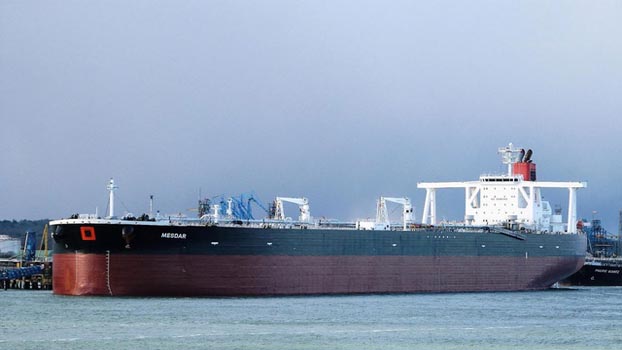Iran tanker seizure: Radio exchanges reveal Iran-UK confrontation

A recording has emerged of radio exchanges between a Royal Navy frigate and Iranian armed forces vessels, moments before a British-flagged oil tanker was seized in the Gulf, reports BBC.
In the recording, what is thought to be an Iranian vessel can be heard telling HMS Montrose it wants to inspect the tanker for security reasons.
The Stena Impero was boarded by Iranian authorities on Friday.
The foreign secretary has urged Iran to reverse the tanker's "illegal" seizure.
In the radio recording, which was obtained by the British maritime security firm Dryad Global, the Iranian vessel can heard be heard telling a ship - thought to be the Stena Impero - to change its course, saying: "If you obey you will be safe."
HMS Montrose then identifies itself and tells the Stena Impero: "As you are conducting transit passage in a recognised international strait, under international law your passage must not be impaired, impeded, obstructed or hampered."
The frigate then asks the Iranian vessel to confirm it is not "intending to violate international law" by attempting to board the tanker.
Iran released footage of the capture of the Stena Impero on Friday.
What happened?
The Stena Impero was seized by the Iranian Revolutionary Guard on Friday in a key shipping route in the Gulf.
Tehran said the vessel was "violating international maritime rules".
Footage emerged on Saturday appearing to show the moment the tanker was raided.
It was released by Iran's Revolutionary Guard-affiliated Fars news agency.
It shows masked forces dropping down ropes on to the ship from a helicopter after it was surrounded by high-speed vessels.
HMS Montrose, was alerted and raced to intervene, as it did - successfully - with another British-flagged tanker just over a week ago.
But this time it was too far away to stop the Stena Impero being seized - the tanker was already in Iranian waters.
Iran's state-run IRNA news agency said the tanker was captured after it collided with a fishing boat and failed to respond to calls from the smaller craft.
But Mr Hunt said it was seized in Omani waters in "clear contravention of international law" and then forced to sail into Iran.
The Stena Impero's Swedish owners, Stena Bulk, said it had been fully complying with regulations and had been in international waters at the time.
It said the crew members, who are Indian, Russian, Latvian and Filipino, were in good health.
A second British-owned Liberian-flagged tanker, the MV Mesdar, was also boarded by armed guards on the same day but was released.
It came after Royal Marines helped seize Iranian tanker Grace 1 off Gibraltar earlier this month, because of evidence it was carrying oil to Syria in breach of EU sanctions.
Iran described the incident as "piracy" but Mr Hunt said the Grace 1 was detained legally in Gibraltarian waters "totally within the law".
On Saturday, UK government ministers held an emergency meeting of Cobra and a senior Iranian diplomat was summoned to the Foreign Office in London.
Afterwards, Mr Hunt said MPs would be updated on Monday about what "further measures" the government would take, adding the threat level had been raised to the highest level of alert.
"Our priority continues to be to find a way to de-escalate the situation," he said.
Speaking after a phone call with his Iranian counterpart, Mr Hunt said Iran viewed this as a "tit-for-tat situation" following the detention of an Iranian tanker in Gibraltar.
But he said "nothing could be further from the truth".
The Stena Impero's owners said they wanted access at the port of Bandar Abbas to the 23 crew members, who they said are in good health.
A UK government spokeswoman said earlier it had advised UK shipping to stay out of the area.
BBC security correspondent Frank Gardner said it appears the Iranian Revolutionary Guard was "quite prepared to push this right up to the brink of a conflict, yet probably stopping just short of one".
What does Iran say?
Iran's foreign minister Javad Zarif tweeted that the UK "must cease being an accessory to #EconomicTerrorism of the US".
He said it was Iran that guarantees the security of the Gulf and the Strait of Hormuz.
"Unlike the piracy in the Strait of Gibraltar, our action in the Persian Gulf is to uphold international maritime rules," he said.
Abbasali Kadkhodaei, spokesman of the state watchdog the Guardian Council, said on Twitter that "the law of retaliation is a recognised concept in international law" shortly after the ship's seizure was announced.




